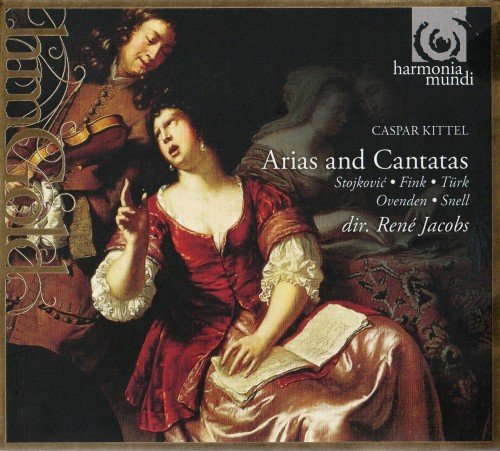
Rene Jacobs & Schola Cantorum Basiliensis Choir - Kittel: Arias & Cantatas (2010)
BAND/ARTIST: René Jacobs, Schola Cantorum Basiliensis Choir
- Title: Kittel: Arias & Cantatas
- Year Of Release: 2000 / 2010
- Label: Harmonia Mundi
- Genre: Classical
- Quality: FLAC (image + .cue, log, artwork)
- Total Time: 72:01 min
- Total Size: 355 MB
- WebSite: Album Preview
Tracklist:
01. Aria XIV: "Ein ieglich ding hat seine zeit"
02. Aria VIII: "Ihr schwarzen augen, ihr"
03. Aria XVII: Als ich nechst war ausspazieret"
04. Aria III: "Coridon, der gieng betrubet"
05. Aria XXIII: "Oime Amor, wie schnell hast"
06. Aria VI: Gleich wie zur sommersziet"
07. Aria XII: "Geht, meine seufzer, hin"
08. Aria I: "Mein lab, wei schone bist doch du"
09. Aria XX: "O du gott der schmerzen"
10. Aria IV: "Wie schone fub"
11. Aria XI: "Ietzund kombt die nacht herbie"
01. Aria XIV: "Ein ieglich ding hat seine zeit"
02. Aria VIII: "Ihr schwarzen augen, ihr"
03. Aria XVII: Als ich nechst war ausspazieret"
04. Aria III: "Coridon, der gieng betrubet"
05. Aria XXIII: "Oime Amor, wie schnell hast"
06. Aria VI: Gleich wie zur sommersziet"
07. Aria XII: "Geht, meine seufzer, hin"
08. Aria I: "Mein lab, wei schone bist doch du"
09. Aria XX: "O du gott der schmerzen"
10. Aria IV: "Wie schone fub"
11. Aria XI: "Ietzund kombt die nacht herbie"
The glittering city of Dresden, whose painstaking reconstruction after it was reduced to rubble in World War II is one of the great success stories of architecture preservation, is a hot topic in the Baroque music field, and this 2000 recording, reissued in budget form in 2010, offers a taste of the excitement. As the seat of the Holy Roman Empire's Elector of Saxony, the city was musically significant even before the rise to power of the man who really made its cultural reputation, August the Strong. Its most famous musical resident in the early Baroque was Heinrich Schütz, who introduced the Gabrieli polychoral style to Germany; composer Caspar Kittel, whose music is broached here by the veteran Belgian historical-instrument ensemble leader René Jacobs and some superb singers and instrumentalists, was a short generation younger than Schütz, although he didn't live nearly as long. These arias and cantatas, Op. 1, published in 1638, were only the second publication in Germany in the new Italian monodic-operatic style. The booklet notes here, in French, English, and German, are of interest primarily to specialists with their close analysis of the relationship of music and text; a lot of it deals with the influence of poet Martin Opitz, a notorious buzzkiller in German poetry books (and, in a clear sign that the sight of the forest was lost for the trees, Opitz's name is misspelled in the title of one of the French booklet essays). General listeners will do better just to tune into the music, where they'll find a composer who was clearly in touch with the latest Italian trends and was putting them to good use on home ground. To sample the best, hear the Aria 3, Coridon, der gieng betrübet (track 4), delivered in the breathtaking blast-furnace voice of Argentine contralto Bernarda Fink. Elsewhere there are pieces ranging from solos to quartets, with a full range of techniques from monodic declamation to full-fledged tunes and antiphonal contrasts employed. Instrumental ritornelli by other composers are inserted as frames, for reasons explained in the notes; they make sense in context. In short, for those who wish that more of Schütz's secular music had survived, this is the place to go. It's gorgeously sung throughout, and at a budget price it's worth the money for Fink's contributions alone. -- James Manheim
Related Release:
Classical | FLAC / APE | CD-Rip
As a ISRA.CLOUD's PREMIUM member you will have the following benefits:
- Unlimited high speed downloads
- Download directly without waiting time
- Unlimited parallel downloads
- Support for download accelerators
- No advertising
- Resume broken downloads


